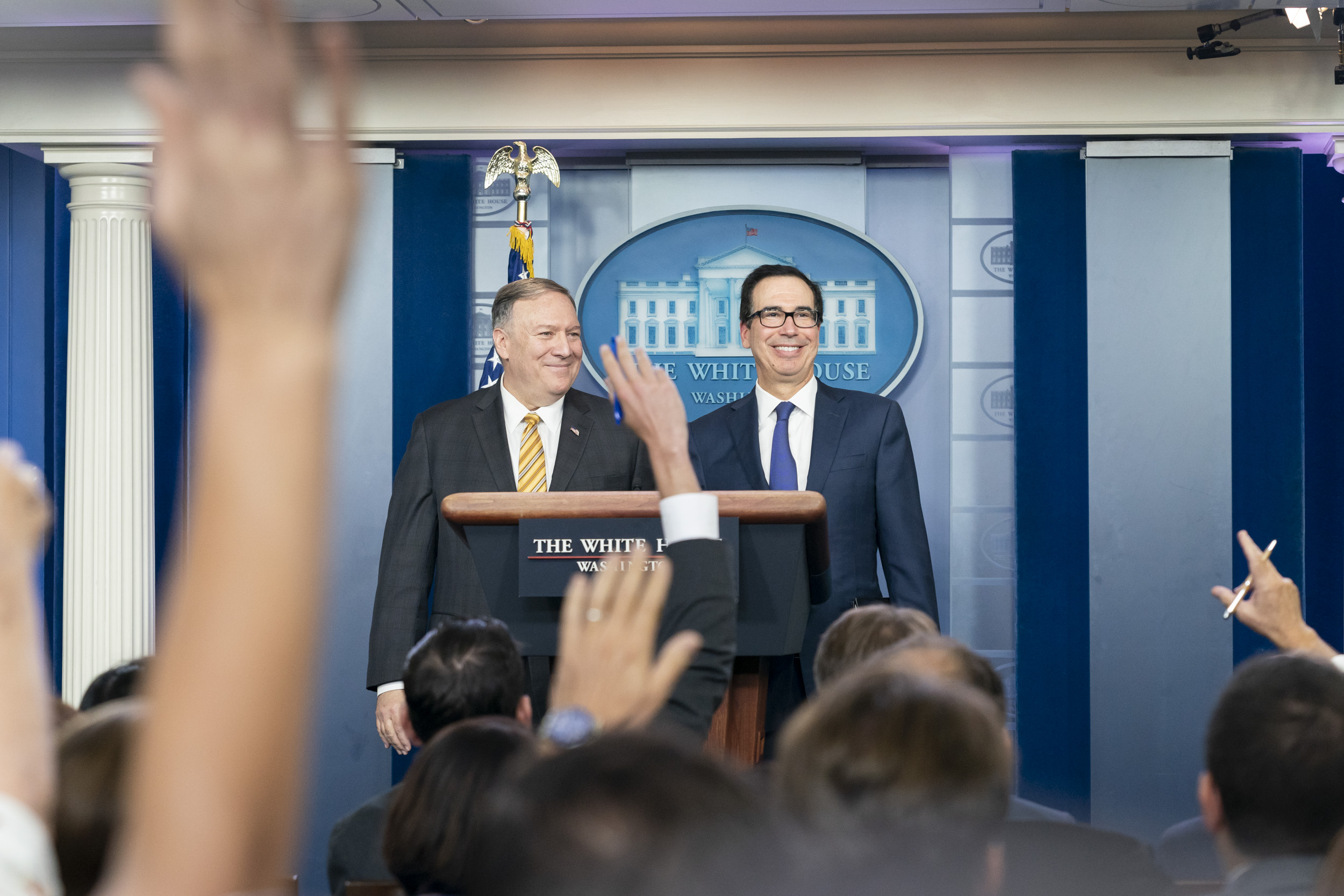Treasury Department Implements New Foreign Investment Rules
New rules governing foreign investment and acquisition of U.S. real estate recently took effect.

Published by The Lawfare Institute
in Cooperation With

On Feb. 13, new U.S. Treasury Department regulations on foreign investment and particular foreign acquisitions of U.S. real estate took effect. These rules amend Title 31 of the Code of Federal Regulations (C.F.R.), Parts 800 and 802, which largely define how the Committee on Foreign Investment in the United States (CFIUS) reviews foreign investment transactions. This enactment follows a notice and comment period that started in September 2019 when the Treasury Department issued two proposals for new regulations to implement the Foreign Investment Risk Review Modernization Act of 2018 (FIRRMA). The new regulations provide clarity on CFIUS’s jurisdiction and better outline what types of foreign investments will receive scrutiny from the committee.
You can see previous Lawfare coverage here and here.
What Are the New Rules for Foreign Investment?
CFIUS is authorized to review any covered transaction to “mitigate any risk to the national security of the United States that arises as a result of such transactions.” The Treasury Department’s new regulations define key terms that determine which transactions are eligible for review and how businesses should notify the committee.
The definition of a covered transaction remains unaltered from the 2019 proposal. Such transactions include “covered control transactions,” “covered investments,” changes in rights of foreign persons that could result in a covered control transaction or covered investment, and any other transaction or arrangement structured to circumvent Section 721 of the Defense Production Act. While comments on the proposal suggested setting a “minimum threshold” for the investment amount or the annual revenue of the U.S. business for the rule to kick in, the Treasury Department declined to set one.
The new regulations did not change the definition of “covered investments” from the proposal either. These investments include direct and indirect investment from non-excepted foreign persons in “unaffiliated” technology, infrastructure and data (TID) businesses that provides the foreign person access to nonpublic technical information, observer or nomination rights to the business’s board or certain substantive decision making. An “unaffiliated TID U.S. business” is, with respect to a foreign person, “a TID U.S. business in which that foreign person does not directly hold more than 50 percent of the outstanding voting interest or have the right to appoint more than half of the members of the board of directors or equivalent governing body.” In response to comments, the new regulation provides an example showing that foreign investments in corporations whose subsidiaries engage in the development of critical technologies still count as covered investments even if the parent corporation does not engage in such development.
While comments asked for a more narrow definition of “critical technologies” as set out in Part 800.215, the Treasury Department noted that FIRRMA does not give it discretion to change this statutory definition through these regulations. The Treasury Department cross-references the Commerce Department’s definition of “emerging and foundational technologies,” which is subject to a separate rulemaking, as required by Section 1758 of the Export Control Reform Act of 2018 (ECRA).
The Treasury Department also opted to keep much of the language of “sensitive personal data” codified in Part 800.241. This definition matters because foreign investment in U.S. companies that handle sensitive personal data could be considered covered investments eligible for CFIUS review. While the new regulation provides some clarifications and examples, a more significant rewrite was undertaken in response to comments expressing concern that the proposed rule on genetic information was overbroad. The new regulation now states that genetic information includes:
The results of an individual's genetic tests, including any related genetic sequencing data, whenever such results constitute identifiable data. Such results shall not include data derived from databases maintained by the U.S. Government and routinely provided to private parties for purposes of research. For purposes of this paragraph, “genetic test” shall have the meaning provided in 42 U.S.C. 300gg-91(d)(17).
The new regulations kept much of the language for “excepted investor” as the proposal, describing which investors are not subject to the rules’ definition of a covered investment. However, these excepted investors are eligible only if they have sufficient connections to an “excepted foreign state.” The Treasury Department has selected Australia, Canada and the United Kingdom as excepted foreign states—which happen to be members of the Five Eyes intelligence-sharing alliance. However, this eligibility is susceptible to an additional criterion that kicks in two years later. On Feb. 13, 2022, a state can be defined as an excepted foreign state only if CFIUS determines that it “has established and is effectively utilizing a robust process to analyze foreign investments for national security risks and to facilitate coordination with the United States on matters relating to investment security.”
Additionally, the Treasury Department issued an interim rule providing a definition for “principal place of business.” This definition is particularly important in determining whether an entity has a sufficient connection to an excepted foreign state, potentially making it eligible for excepted investor status. Per Part 800.239, a principal place of business is “the primary location where an entity's management directs, controls, or coordinates the entity's activities, or, in the case of an investment fund, where the fund's activities and investments are primarily directed, controlled, or coordinated by or on behalf of the general partner, managing member, or equivalent.” However, if the entity has previously represented to the United States or other foreign governments that any of the foregoing is outside the United States, then that location is considered its principal place of business unless the entity can demonstrate that the location has changed to the United States. The comment period for this interim definition closed on Feb. 13 and remains effective.
The new regulations also expanded the application of the “incremental acquisition rule.” Essentially, if a foreign entity already gained control through a past covered control transaction that CFIUS reviewed, an additional acquisition of interest in the business would not be considered a covered control transaction. The 2019 proposal applied the rule only to incremental acquisitions that came after the committee concluded all actions on the basis of a notice filed pursuant to Part 800.501. The rule now also applies to transactions made subsequent to a covered control transaction submitted to CFIUS by a declaration, and for which CFIUS concludes action based on that declaration.
The new regulations also implement parts of the Pilot Program Interim Rule (codified in 31 C.F.R. Part 801) including mandatory filing requirements for covered transactions involving critical technologies. Declarations to CFIUS remain mandatory for certain transactions involving a ‘‘substantial interest’’ by a foreign government. And the new regulations still hold that a substantial interest between a foreign person or entity and a U.S. business is defined as a 25 percent or greater voting interest. However, the new rule clarifies that the relationship between the foreign government and the foreign entity would have to be at least a 49 percent voting interest in the general partner, managing member or equivalent of the entity. This focuses the analysis on the entity that typically is responsible for day-to-day decision-making. While comments have noted the challenges that mandatory declarations pose for foreign investment, and recommended possible solutions such as “comfort letters,” the department opted not to make any additional changes.
What Are the New Rules for Real Estate?
The final rules add more clarifications and details to real estate transactions. As part of implementing FIRRMA, the department established a new section of 31 C.F.R. Part 802, known as the geographic coverage rule. Under this rule, transactions with foreign persons involving real estate in proximity to certain ports (including both airports and maritime ports) or military installations can now be reviewed under CFIUS. This rule is intended to prevent foreign governments from being able to collect sensitive information on U.S. ports and military installations by being in close proximity to these installations.
FIRRMA included exclusions to CFIUS review for real estate transactions such as single housing units and most real estate in urban areas. While the Treasury Department works on a web-based tool to help the public understand the geographic coverage rule, interested parties can use the Department of Commerce’s web-based system, TIGERweb (Topologically Integrated Geographic Encoding & Referencing), to view maps that show where military installations are located. After listening to feedback during the comment period, the Treasury Department added a number of additional illustrative examples, clarifications to the text and updates to a number of provisions as covered in the investment rule portion of the article. Two updates particularly affect real estate transactions under CFIUS. First, the department modified the exceptions for certain real estate transactions in proximity to airports and maritime ports including real estate transactions for retail trade, accommodation or food services. Second, Appendix A was refined to list more completely the military installations included in the geographic coverage rule.
Will There Be Future Rulemaking?
While FIRRMA authorizes CFIUS to collect fees for written notices in covered transactions, the new rules do not address this issue. The Treasury Department will issue a proposed rule implementing a fee at a later date.
Additionally, the Treasury Department plans to issue a notice of proposed rulemaking that would revise the mandatory declaration requirement regarding critical technology (Part 800.401(c)) from one based on the North American Industry Classification System codes to one based on export control licensing requirements.
The Treasury Department noted several comments that asked for a type of waiver for “trusted investors.” After evaluation, CFIUS would waive these foreign investors from mandatory declaration requirements. While the current regulations have no such waiver program, the Treasury Department may consider instituting one in the future. However, the department did not specify if it would do so through a future notice of proposed rulemaking.






